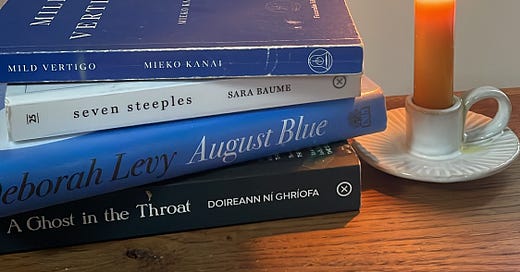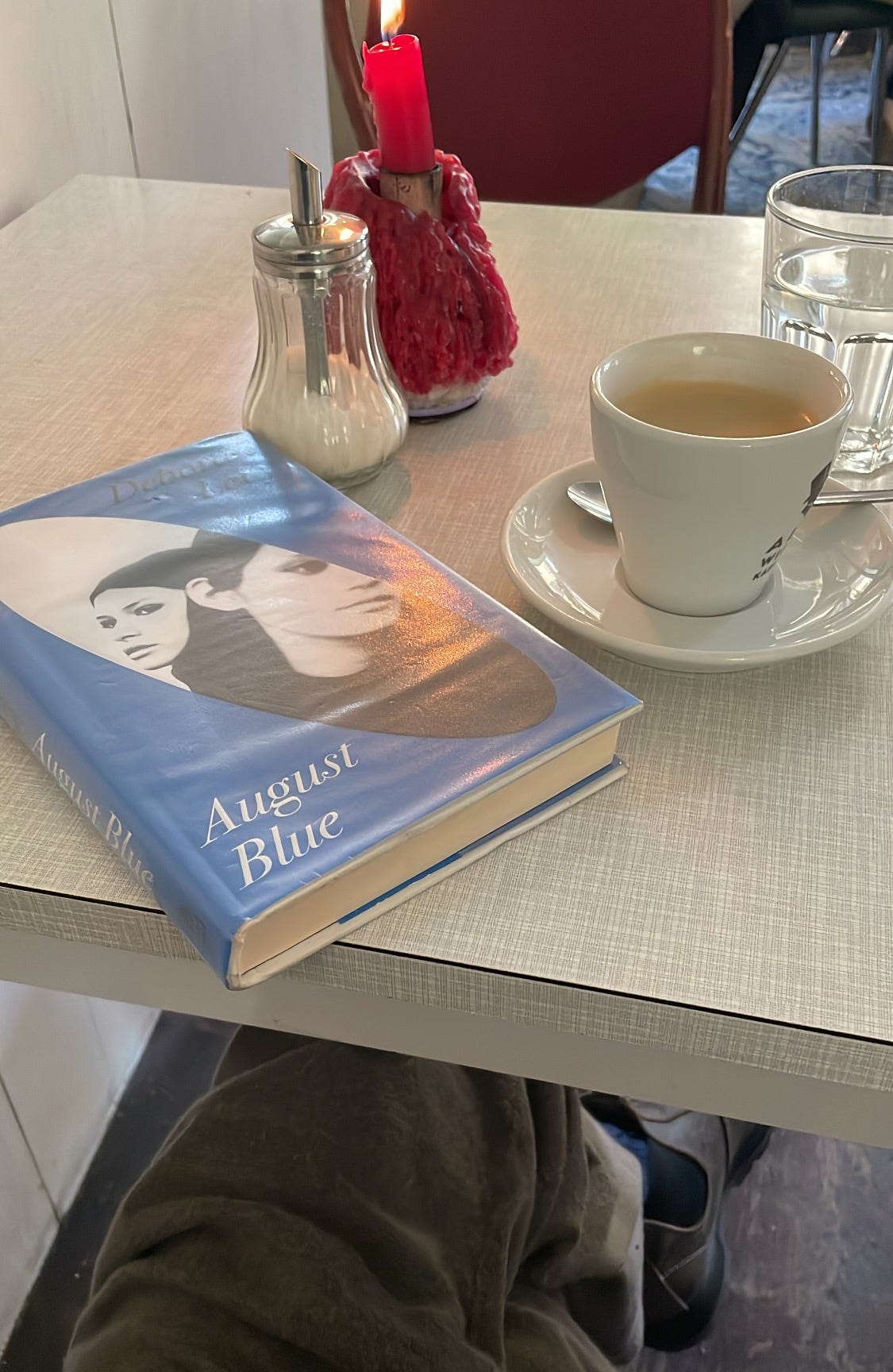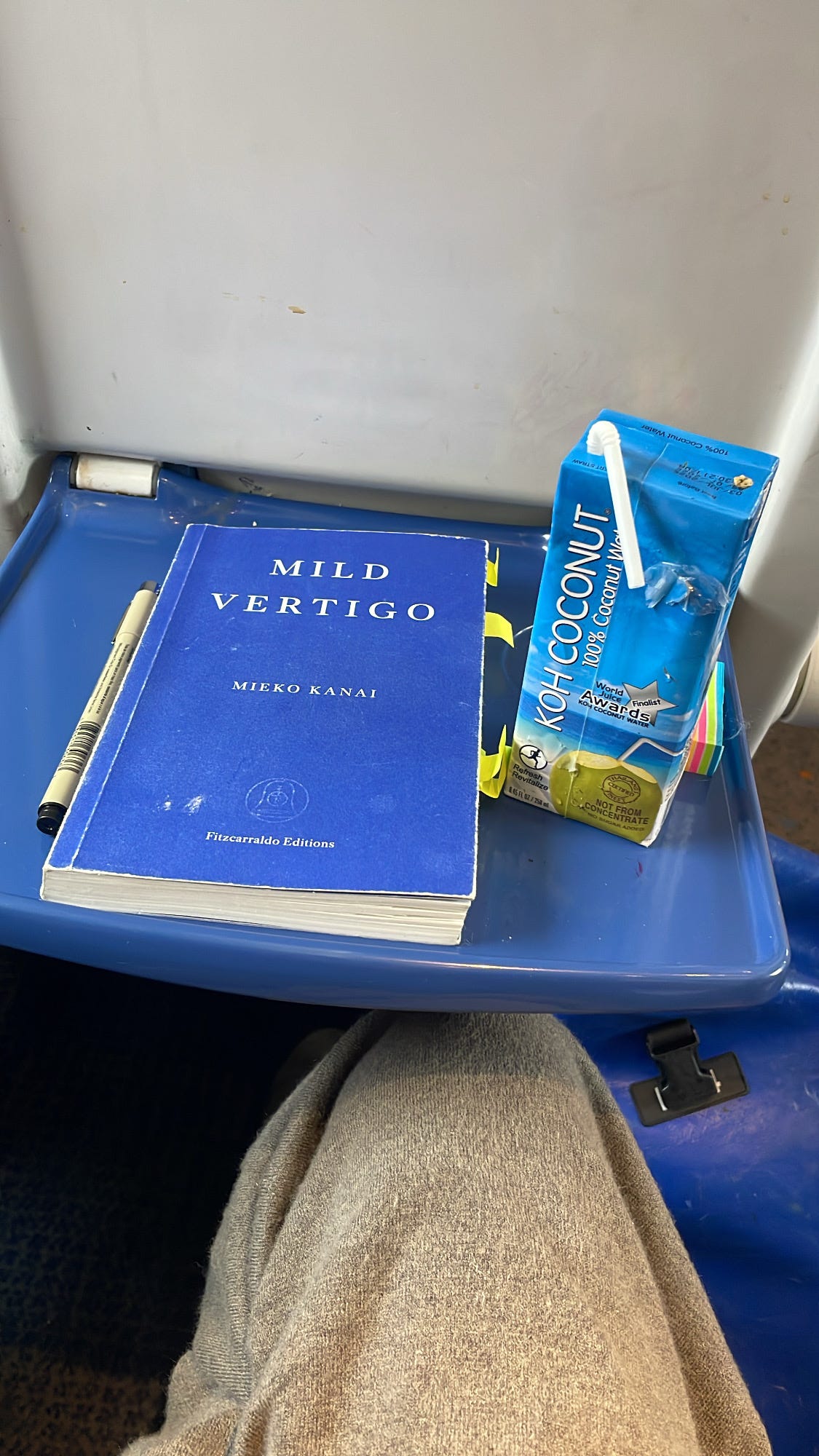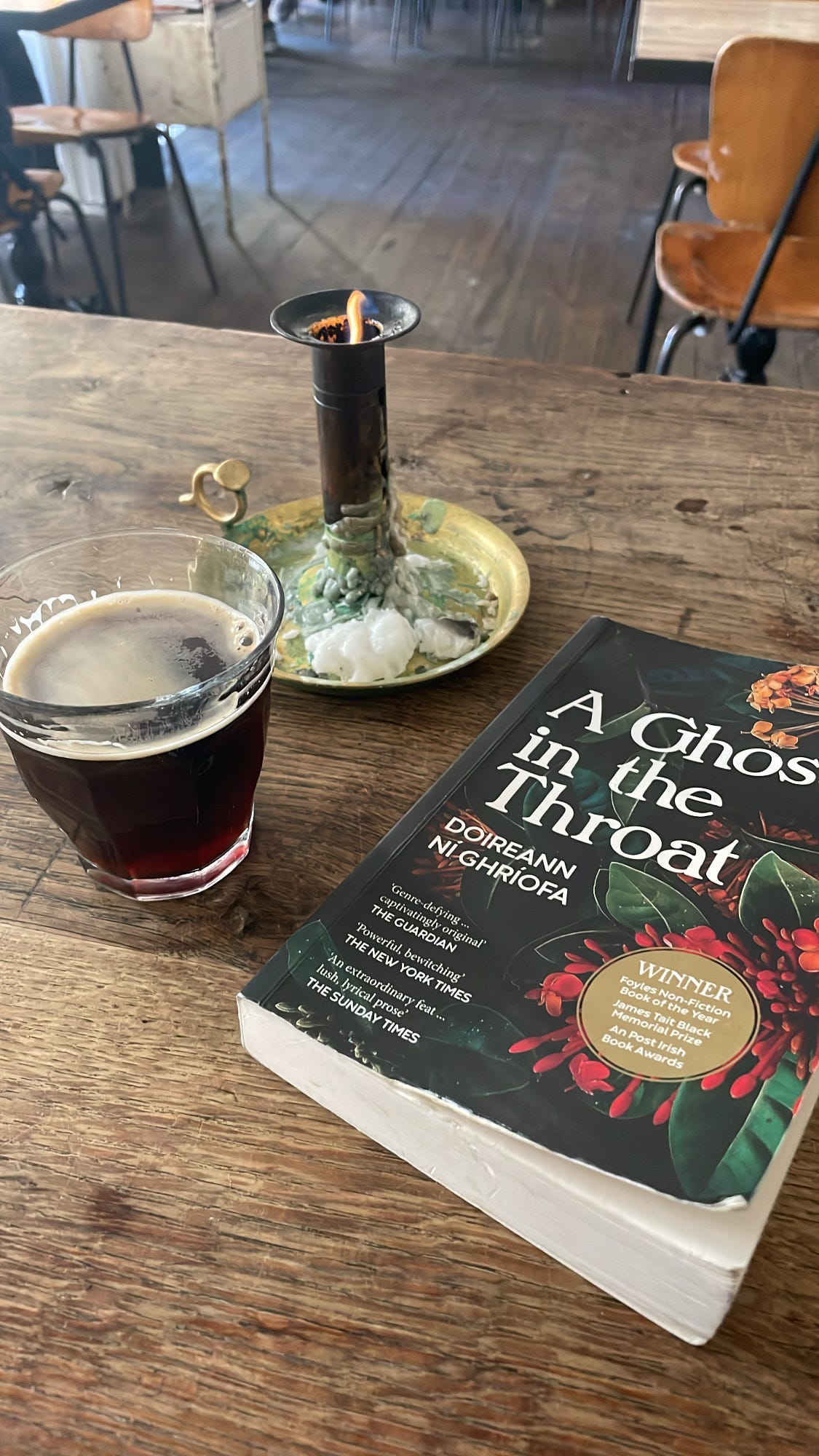Dear ghouls, gremlins, ghosts, good witches and humans,
Hope you are feeling the mystery, this day.
The spooky season treads delicately upon us. I have scoured the library for the following four books (besides Ní Ghríofa’s beautiful “A Ghost in the Throat” which jumped from the shelf of a little poetry bookshop in Ennistymon).
The books I will review are
Deborah Levy’s “August Blue” 2023.
Sara Baume’s “Seven Steeples” 2022.
Mieko Kanai’s “Mild Vertigo” originally published 2002, translated 2023.
Doireann Ní Ghríofa’s “A Ghost in the Throat” 2020.
There are very particular threads running through these four books: themes of identity, oneness, and the varying roles of women in society.
Deborah Levy, August Blue
As my first dip into the fiction of Deborah Levy, I was not at all disappointed by this book. The whole narrative is drawn in the most ‘almost-there’ sort of way. It is a strange novel, flitting, gripping. The first person narration brings a sense of intimacy, as much as it muddles the reader. The basic premise is this: a woman (a young, single, famous pianist) named Elsa is in an Athens flea market when she sees a stranger buying two mechanical horses, which dance when their tails are pulled up. Both women are wearing the same coat, a green trench, tightly belted. Elsa feels irritated that the women bought the horses, as she wants them too. Later on she finds the hat the woman was wearing, and steals it “I was glad to be wearing my hat. Her hat”— the use of ‘my’ and ‘her’ is interchanged, giving the sense of a melting of selves.
This is a story of a young, retired pianist — an orphan who never met her birth mother or father, and her sense of a lost identity. It is written in the most dream-like, ethereal way, tension is constant and almost heartbreaking. We see her insistent avoidance of her birth papers, her gaze moving constantly outwards, refusing, almost, to ask herself the bigger questions, refusing to go inside.
The reader is left with questions — why did she walk out of her concert in Vienna, where is her life going, why is she so obsessed with this women she’s never spoken to, why won’t she look at her birth papers to find out who brought her into the world? Instead she hops about Europe during the tail end of the global pandemic, teaching music to young, wealthy students. “I was sorry to leave Greece. I knew I was running away from everything, but I did not want to plunge a fork into my life and look at it too closely”.
Elsa is not the only one struggling with identity crisis, her best friend Rajesh describes “If my identity is so fragile it requires a flat white to keep it together, I can’t see the point of those years I’ve spent reading difficult theory and philosophy. Capitalism sold a flat white to me as if it were a cup of freedom”, “I was serene when I was a teenager. I became neurotic at twenty when I started to drink avocado smoothies and think only positive thoughts”. Identity is a fickle thing. This book looks at the splitting of self based on what one sees promoted in the media, acknowledging the inevitability of some form of identity confusion in a world ruled by capitalism. Even the conversations Elsa holds within her own head between herself and her Doppelgänger demonstrate this divide — even if we do not have a doppelgänger or ghost, our internal monologue is peppered with the dialogue of others.
When Elsa does finally have an actual, sit down conversation with the woman who is her doppelgänger, the two agree to stay with the surface level daily continuities of life, to remain true to this era of Capitalist progression, “We agreed that whatever happened in the world, we would still rub conditioner into our hair after we washed it and comb it through to the ends, we would soften our lips with rose scented lip balm, and though we would be interested to see a wolf perched on a lonely mountain, we liked our household animals to betray their savage nature and live with us in our reality, which was not theirs”. Identity is seen as something both external and internal, as much gaurded by external forces as internal ones. These are not ‘women who run with the wolves’, or rather, they are, but only if the wolf in questions is domestic.
There are some phrases that are pure poetry. They are carefully intertwined with the narrative to bring an even greater weight to the theme of oneness and identity.
“I wanted the old world to melt like winter snow”.
As it is set during the global pandemic, Levy also notes how it brought us together just as much as it tore us apart:
“I was living in a very strange way, but I knew there were people in the world who were also living like this.. This mood, with it’s ambiance of low level panic and hyper alert connections to everything, would have it’s double or echo”.
I won’t spoil what happens in the end, but her step-father does die, to the chiming of Elsa’s piano music which he taught her, as both her teacher and her father and her manager. It is a profound moment, and only at his death does she realise that her potential as a human lies outside her identity as a musician:
“As the feral cats hissed and the ambulance moved through town, I cancelled everything I thought I was and let in everything else that came to me. It was a kind of memorial, not just for my father teacher, but for the virtuoso he had created”.
Overall it is a beautiful, shadowy book, one that can be easily read in one or two sittings for the writing carries you with it. I have no other words than ‘vibes’ to describe how it felt when reading. Definitely blue though, if it were a colour — blue as the Mediterranean she so beautifully describes, blue as the gorgeous book cover. The character moves from place to place, we engage in her transient lifestyle and her ability to see herself in another person.
Sara Baume, Seven Steeples, 2022.
Having thoroughly enjoyed Baume’s memoir, ‘Handiwork’, I decided to have a go at her fiction, a happy library surprise.
This is a wholly different book to ‘Handiwork’, however, tracing the life (or rather, lives) of an Irish couple, Bell and Sigh, and their two dogs, as they hide away in an old cottage on the Irish coast, at the foot of a mountain. It is a quiet, contemplative read, almost like the changing of the seasons. Baume’s love of animals, all of their quirks and idiosyncrasies, is apparent throughout:
“Out on the peninsula, when it was calm, stone washed butterflies spewed from the heather, painted ladies that had flown all the way from Southern Europe to escape a drought. When it was wild, Voss’s windblown coat .. were tattered and decurled from the volley of wind”.
The discovery of a rogue mountain goat is beautifully described (having grown up in Clare, I’ve met many a wild goat lurking in a hedgerow, and was pleased to find they also like beaches) — “Its beard dragged the mud. Its horns sailed up and out, rose and dipped and rose again in the shape of a large bird’s splayed wings. It’s voice was ragged and lifting.. They found the wild goat on the beach”.
The book takes place over the course of a whole seven years, and is completely void of dialogue. Contrasting to the Levy book, this is not a page turning insight into the workings of someone’s brain, buy is rather a slow, meditative, book-length poem. It is a commentary on the beauty and peculiarity of living an isolated life in nature, one in which rather than giving the humans focus, the focus is given to the changing landscape itself. The humans, on the other hand, are prone to decay, to letting things get a little out of hand, but this only feels natural given the passage of life into death and death into life that occurs over the course of the book:
“In September the nights finally cooled. Bell put away her swimming cape and their salt-damaged suits. The stove was relit. The insects that had become trapped inside the house in summer commenced to hibernate or to die.”
“They were moved by how quickly a body untidies itself” — the couple become increasingly entangled within the surrounding landscape, at the same time, the ‘couple’ become increasingly linked, through isolation and proximity, giving the sense that they are no longer a couple but one and the same person — “One had stooped, the other stretched, and so, from a distance, from behind, they looked identical”.
This concept of decay is hinted at throughout — their world decaying and dying in time with the seasons. This feeling of becoming smaller and smaller is tied up with the sensation that there is no separation between the couple and their environment, nor between each other, that all along they were no more than the mountain itself. On Christmas they sit in their van and “watched new drops replacing old drops on the rain, fresh waves crashing against familiar rocks, the head of the seal holding its position in the furious sea. And they talked about how small their life had become, almost nothing; about how likely it seemed that some society other than that of their rooms still existed, out there”.
Unlike August Blue, in which the protagonist finally reads her birth papers and discovers who she is and isn’t, this novel ends with the two main protagonist’s souls colliding and becoming one and the same person. In the life of Bell and Sigh, there is no real distinction between domesticity and wilderness, self and other, home and mountain. The final passage suggests that they did, over the course of seven years, actually lose their individual identities and become one:
“One pillow / one toothbrush / one key / one kitchen knife — the traces of a sole person, or so it seemed, a / sole / life.”
This book is really a poem, a very beautiful and long one. It is completely unique and initially I was confused as to where the book was heading until I realised that is to miss the point — the point is noticing. Noticing the tiny mysteries of life, the changing of the seasons and the losing of a ‘self’.
Mieko Kanai, Mild Vertigo, 2002.
This book was a spontaneous joy bookshelf discovery. I could not tear myself away from it, despite the fact that nothing really ‘happens’ per se, except for the daily interactions of life as a Tokyo housewife named Natsumi. The run on prose is lacking in full stops, and there is a growing sense of overwhelm paired with small joy — the ‘mild vertigo’ of the title describes the subtlety of shopping lists, or a brain continually burning. The narrative is dizzying even for the reader, but in the most spectacular, immersive kind of way.
Written by Japanese writer Mieko Kanai in 2002 originally, it has since been translated into English in 2023. Occasionally the reader is let in to what Natsumi’s values are surrounding home and marriage and family, but most of the time, there is the sense that Natsumi is really only following outside guidance and influences whether from other housewife friends or media. She decides on their apartment “because it looked like the interiors she often saw and admired in glossy pages of women’s magazines, and it had a kitchen island with a breakfast bar, as was now all the rage”.
“and when you get too used to the taste of fried food you end up finding anything else somehow lacking, in a way that’s a kind of addiction, just like smoking or alcohol or drugs, at least that’s what she read in a magazine article”.
Like Baume’s novel, the protagonist’s life is getting increasingly small and tightly knit. But whilst both ‘Seven Steeples’ and Kanai’s ‘Mild Vertigo’ are similar in that they are about the daily conundrum of domestic life — “and she found that she was as busy as ever without really being able to say what occupied her days”, they differ in that Baume’s characters have no need to fit into society, as they are completely immersed in nature, whereas for Natsumi, fitting in and keeping on top with daily tasks and cleaning forms the basis of her life:
“Natsumi thought that tonight she wouldn’t make sukiyaki after all, but bolognese instead, and as she pictured the contents of her cupboard and her fridge, she figured out what she needed to buy in the supermarket, canned tomatoes,..” and then, within the same sentence “she started visualising how the supermarket looked inside, how she would go in” and then, two pages later but still within the same sentence she writes “picturing it all half-unconsciously, and then as she was remembering that she’d bought beef for frying in butter but thinking she could always put in the food processor to make mince, she started feeling faintly nauseous, and her field of vision began to sway slightly in a way that was different from the vibrations of the train, as if she were experiencing a kind of mild vertigo”.
Natsumi begins to resent her housewifery as a thief of the soul: “and by now she were so utterly bored with this type of shopping that she could picture in her mind the way that the goods were laid out before even leaving her house”.
Towards the middle of the book she finds a magazine which suggests her identity can consist of both housewife and live their dreams — “when you look at yourself, are you sometimes visited by the lonely feeling that the world is moving on without you.. It is possible to be housewife and realise your dreams!” — which gives Natsumi a sense of hope, until we realise that this hope is false, as the final paragraph of the book brings us back to the recounting of shopping lists and the ‘mild vertigo’ of her existence.
Overall this is a mesmerising read and though it takes a minute to settle into, it is well worth it.
A real window into the life of a Tokyo housewife, whose daily questions, thoughts and fears, describes a cultural mindset transcending time and location, that feels both close to home and so very far away.
Doireann Ní Ghríofa, A Ghost in the Throat, 2020.
I was almost afraid to rate this book by the wonderful Irish poet Doireann Ní Ghríofa, for such was how it captured me. My review won’t do it justice, so there’s no hope in that, it simply needs to be read. The book is full of echoes.
Part personal memoir part poetry part history, the narrative follows Doireann Ní Ghríofa’s fascination with the eighteenth century Irish poet Eibhlín Dubh Ní Chonaill, who she discovered through her poem Caoineadh Airt Uí Laoghaire, which Eibhlín wrote as a lament to her dead husband, Art O’Leary. This dead woman poet is the ‘ghost’ of the title — for the narrator is, in a sense, haunted by this woman and her words and wild ways. So much so that she begins to lose herself, to ebb away — in a sense, to become like a ghost herself: “Of all that I desired in my own small life, the discovery of another women’s days had become what I wanted more than anything else. More, even, than sleep. In pursuing this struggle, my principal nemesis was myself.. I hoarded every scanty fact and carried them through my days, untethering my imagination as I did my chores, or bathed my children, or sat in traffic.. all the while inside me, she was beginning to feel more and more real”.
The narrators life is composed of mothering, cleaning and all the daily tasks that make up a modern life. Her body feeds other lives through the act of breastfeeding, and all the other things women have the capacity to hold. She writes: “Literature composed by women was stored not in books but in female bodies, living repositories of poetry and song”. In this book, doing the housework itself is seen as poetry, with a list of daily tasks waiting to be crossed off: “I cling to my list because it is this list that holds my hand through my days, breaking the hours into a series of small, achievable tasks”.
This book is unique in that though it is written in first person, there is often the sense that there are two people within the narrator — her, and her poet ghost. Her life as a breast feeding mother is fed by her relationship to this dead poet — like the Levy book, Ní Ghríofa gives the sense of losing oneself in someone else’s life, or a blurring of souls. Towards the end of the book, once the author has exhausted her enquiry into the life of Eibhlín Dubh, and her children are no longer breastfeeding, she encounters a sense of loss: “I grow frantic, seeking some new line of enquiry, anything that might allow me to continue this journey”.
Ní Ghríofa is adept at weaving the past into the present moment so it almost becomes as embodied and felt as her real life itself:
“Her life and her desires were so different from mine, and yet she felt so close. Before long, the poem began to leak into my days.”
“We may imagine that we can imagine the past, but this is an impossibility. As a child I was so enchanted by history that I would sometimes sit by a stream and try to daydream myself back in time. To the hurry burble of water, my mind set to work, forgiving first the distant buzz of traffic.. through clumsy acts of further deletion, trying to subtract all the other resonances of modernity”.
But the author proves adept at imagining herself back to the past, spending her free moments in search of the places of her female poet ghost, in search of threads and clues that may have been lost to the ebbs of time — “We are lifted over the river by a bridge so narrow that it sings less of engines and more of hooves. I open our windows and cut the engine. Birdsong flutters in. It may be late October, but the trees are still deeply leaved, singing richly in the breeze, exactly as trees sang when Eibhlín Dubh approached this place. Goosebumps punctuate my skin” .
Throughout this work there is a deep running theme of connection — connection to oneself, connection to the past, connection to one’s family. In finding out about Dubh’s life, the author recognises the role that is played by other people extraneous to her — oftentimes, she finds out more about the poet through looking at her family members or husband, or through the research of other historians.
This novel is a march — Doireann Ní Ghríofa’s quest to discover the life of another poet, both real and unreal, is gripping from beginning to end. At the final pages of the book, Ní Ghríofa resigns to the ghosts within the ghost, returning to her own life, her own ghosts, and, in a sense, surrendering. Surrendering to the gaps and cracks where she has maybe mis-imagined or interpreted the text, and the beauty of the mystery:
“Before my life collided with hers, so many hours were spent skittering between the twin demands of milk and lots that I hadn’t noticed how blurred the furze had grown around me. Now I delight in the yellow petals jigging in the breeze, in every thorn-tip, and even in the bare gaps between them”.
“these years have shown me an oblique kind of holding — I have held her, only to find that she holds me too, close as ink on paper and steady as a pulse”.
I loved this book, everything was felt, every page had an echo. Highly reccommend.
So there it is, those are my four ghosts! I hope you enjoy this review, and would appreciate if you could subscribe for these musings, as they take a while to create — free or paid, it is all very much appreciated.
Thank you, and have a spooky day!
Ailbhe xxxx







